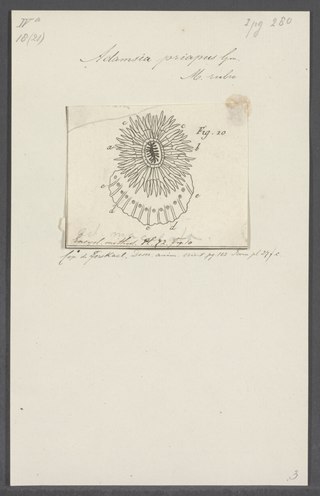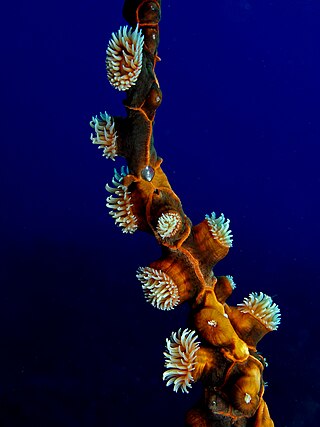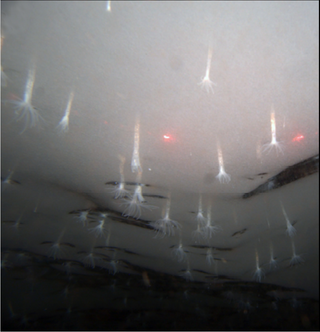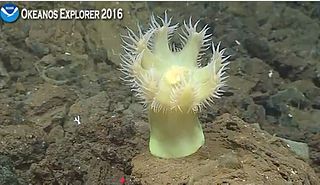
Actiniidae is the largest family of sea anemones, to which most common, temperate, shore species belong. Most members of this family do not participate in symbioses with fishes. Three exceptions are the bubble-tip anemone, snakelocks anemone and Urticina piscivora.

Edwardsia is a genus of sea anemones, the type of the family Edwardsiidae. They have eight mesenteries and live in tubes in the sand. The name, in Neo-Latin, commemorates the French zoologist Henri Milne-Edwards.

Adamsia is a genus of sea anemones in the family Hormathiidae. Species in this genus are mutually symbiotic with hermit crabs. The anemone gets a place to live and discarded scraps of the crab's food in exchange for its help in the crab's defence. As these anemones grow, they secrete a horny membrane, known as a carcinoecium, which overlies the crab's original snail shell and expands the living space of the crab. This means the anemone does not have to change substrate and the crab does not have to seek a larger shell as they both grow.

Amphianthus is a genus of sea anemones. It is the only genus in the monotypic family Amphianthidae.

Anthothoe is a genus of sea anemones in the family Sagartiidae.

Bunodactis is a genus of sea anemones in the family Actiniidae.

Epiactis is a genus of sea anemones in the family Actiniidae. There are about nineteen recognised species and the type species is Epiactis prolifera.

Edwardsiidae is a family of sea anemones. Edwardsiids have long thin bodies and live buried in sediments or in holes or crevices in rock.

Anemonia is a genus of sea anemones belonging to the family Actiniidae.

Palythoa is a genus of anthozoans in the order Zoantharia.

Aiptasiidae is a family of sea anemones, comprising the following genera:

Metridioidea is a superfamily of sea anemones in the order Actiniaria. Members of this clade live in shallow subtropical waters worldwide.

Actinostolidae is a family of sea anemones in the order Actiniaria. Members of this family are deep sea species, with some occurring at hydrothermal vents.

Actinostola is a genus of sea anemones in the order Actiniaria. All members of this genus are deep-sea species, with some occurring at hydrothermal vents.

Diadumene is a genus of sea anemones. It is the only genus in the monotypic family Diadumenidae.

Edwardsiella is a genus of sea anemones in the family Edwardsiidae. It is named in honour of Henri Milne-Edwards, an eminent French zoologist.

Pachycerianthus is a genus of marine tube-dwelling anemones in the family Cerianthidae.

Actinernidae is a family of sea anemones. It contains the following genera and species:
Halcurias is a genus of cnidarians belonging to the family Halcuriidae.
















